Finding a leak on your water heater is one of the issues that a homeowner encounters. If you're one of those who have experienced this problem, then this article is for you. We have researched what you should do upon noticing this and here is what we learned:
You should detect where the leak is before turning off the water and power supply. Once you've determined the location of the opening, you can start repairing it. However, if you lack the skills or the problem is too complex for you, it is best to have a professional plumber do the job.
Next up, we will talk about this topic thoroughly, and we will provide you with details for a better understanding. Then, we will enumerate the reasons why the leak occurred, how to fix them, and how much it would cost. If you're interested in learning these, keep on reading.
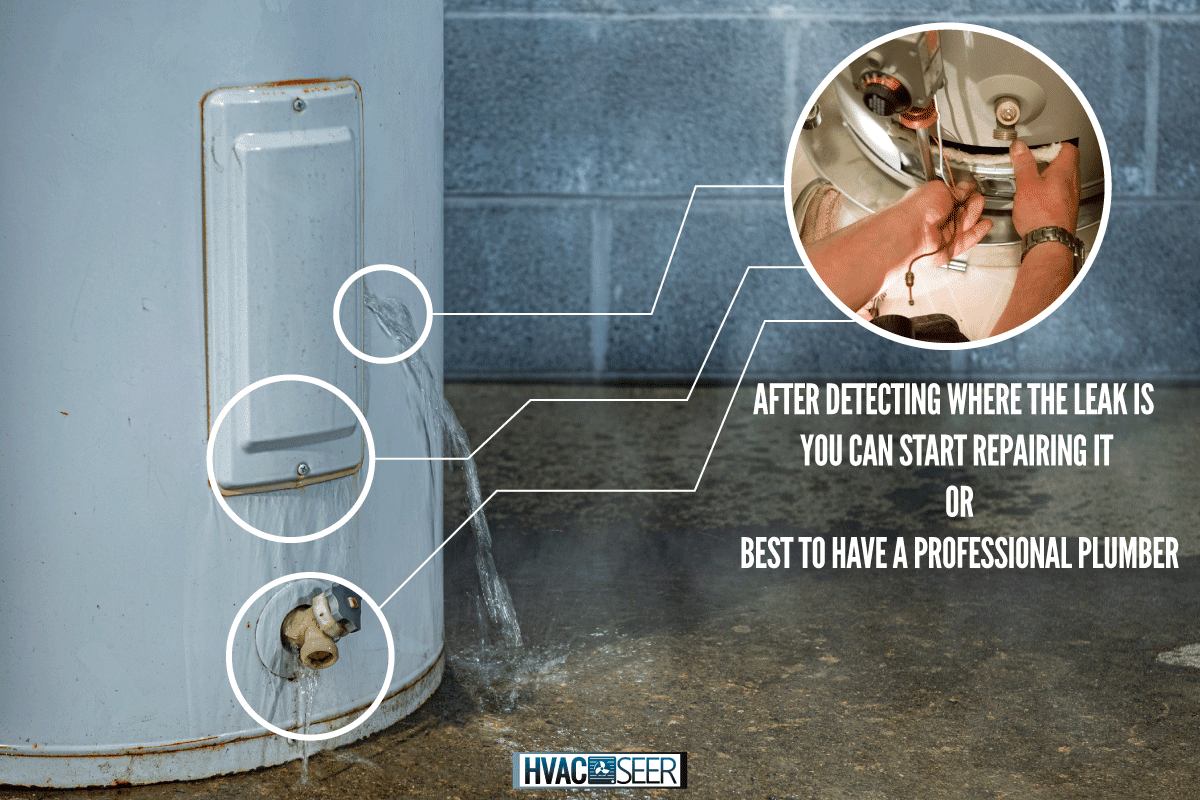
Things To Do When The Water Heater Is Leaking
Water leaking can damage your walls, floors, or furniture nearby. That's why it's best to address it immediately. But before we begin talking about how to do that, we should be aware of how it happened first.
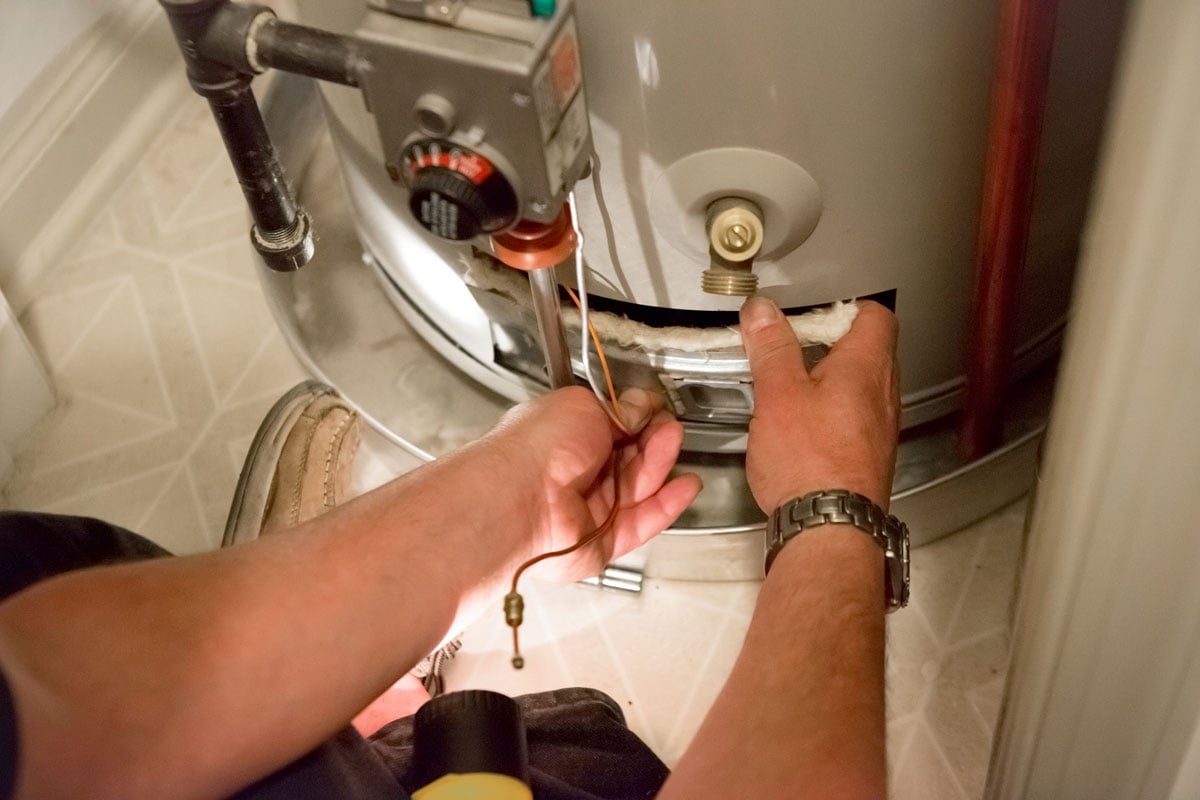
Causes Of Water Heater Leak
Every household that owns this appliance is probably using the heater every day, might it be for taking a bath or doing chores. This is why it isn't surprising that issues like this will occur since they can wear out over years of usage. And some of the reasons why water heater leak requires a simple repair or a full replacement.
A minor leak may have a few drops of water, while a severe case had a stream flowing from it. Anyhow, here are the common reasons why your perfectly working heater begins to leak:
- There's a crack in the tank. This means that the tank's aged. Corrosions, cracks, or fractures can be accumulated by the high pressure and sediment buildup inside it. The longer it's exposed to these factors, the more likely a leak will occur.
- Its gasket deteriorated. If the spilling comes from the top or bottom area, this is probably the reason. The tank's gasket, a mechanical sealant used to hold the heating elements intact, is probably worn out already.
- Temperature or pressure (T&P) valve is damaged, not closing, or is not working properly. This valve guards you against burns caused by excess high pressure and ensures there is no leak in your heater since it can result in low water pressure. So, if there's a leak, then there probably is a problem in your T&P valve.
- The pipes or water line connections are loose or rusty. If these are not tightened, chances are that the water pressure flowing in them can spill through them.
- Drain valve's not closed tightly, or maybe the seal has grown weak through time.
- Your tank's experiencing extreme pressure inside.
Now that we've listed down the probable reasons why your heater's leaking, we can now proceed to what we should do upon acknowledging the problem. We will list down the three simple steps that you should follow. Let's start?
Step 1
Determine where the leak's coming from and confirm that it's leaking. The most common areas where the leak occurs are the top and bottom parts of the tank. Do this by turning off the power. If you're using a gas heater, simply shut the gas off. Meanwhile, for electric heater users, switch off the electricity or circuit breaker for it.
Using a clean cloth, remove the dirt in and around the valves. as well as the supply lines. Wipe them off until dry. Next, wait for a while and give the water some time. If moisture forms, then it's probably a simple condensation and not a leak. However, if water drops from a specific spot, then it's a confirmed problem.
For more specific leak tests, electric water heater users should detach the safety shield and access panel. Check for any marks of stains and water leaking around the equipment. If you're using a gas heater, look after the rusted parts or burner. See and hear any dripping of water.
Step 2
Turn off the power supply. Make sure that it's properly turned off since electricity can flow in water. It's best to use electrical gloves and rubber boots when dealing with anything that has electricity.
For electric water heater: Find the breaker for your heater in the circuit breaker panel. Once spotted, switch the position towards the "off" direction.
For gas water heater: Find the thermostat (located at the bottom of the water heater) and turn (clockwise) the knob on top of it towards the "off" indicator.
Step 3
Drain the tank. This is to avoid more water damage. This process may cause the water to spill throughout the floor. To prevent this, open the drain faucet and catch the water with a container. Turn it off once it is full before pouring it out on the sink or drainage. Repeat the process until there's no more water left inside.
Another method is to attach a hose to the drain faucet. Make sure it's firmly attached. Put the other end of the hose towards the sink or drainage. Before opening the faucet, support the hose that's there; the water pressure may be too strong to push it away.
Step 4
Close the cold water valve to keep the water from flowing into the pipes. This is typically placed on the top of the If you cannot find it, you can turn off your home's main water supply instead. This is usually placed outside your house.
To turn it off, turn the valve in the clockwise direction until it's not on anymore. To release all the remaining pressure in your water line, open one faucet and let the water be entirely drained.
Learn more about this here: "How Long Does It Take To Drain A Water Heater?"
Step 5
Now that the power and water supplies are blocked, we can proceed to the actual repair. The following repairs are according to the most common reasons why water heater leaks that we have discussed earlier. Some problems would require professional help.
If the cause of your leak's a cracked tank, deteriorated gaskets, damaged temperature and pressure (T&P) valve, high pressure on the tank, or loose drain valve, you should contact a plumber to have them inspected and replaced. However, if you have the knowledge and skills to do so, you can do it yourself.
On the other hand, you can fix the loose pipe or water line connections by tightening them with a wrench.
How Much Does It Cost For Water Heater Repair?
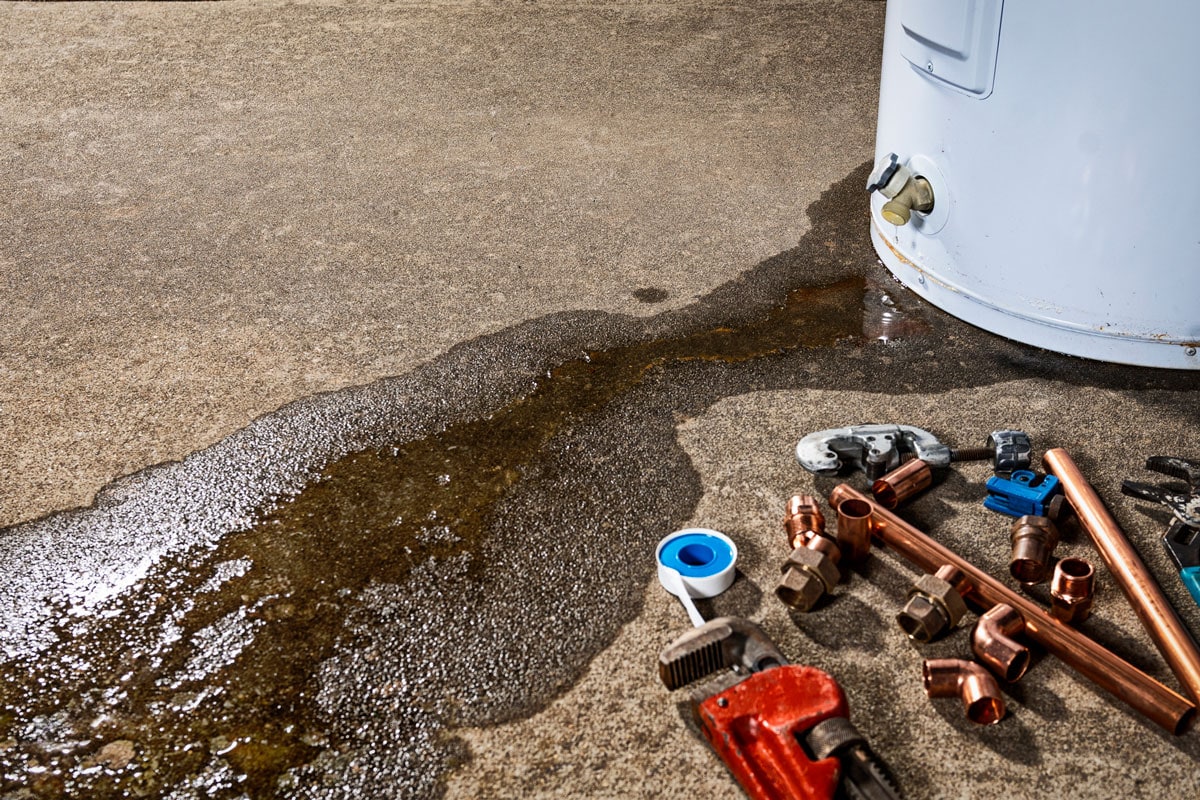
The repair price for the water heater ranges from $50 to $600. This may vary on how complex the leaks are. If the plumber discovers more problems than the leaking, you might add more money to this. Speaking of other issues, you may be curious on what are the average estimation of repair price per water heater brand. Here they are!
- Whirlpool: $100 - $550
- GE: $100 - $750
- Kenmore: $150 - $600
- A.O. Smith: $150 - $650
- Rheem: $175 - $700
- Rinnai: $175 - $725
- Bradford White: $200 - $750
The variation of prices here's because some of these brands use more expensive parts. Take note that these are just the average cost of repair. This may still change depending on what type of issue or problem you will have the professional plumbers fix.
Read more here: "How Much Does It Cost To Move Water Heater?"
Should You Replace Or Repair Your Water Heater?
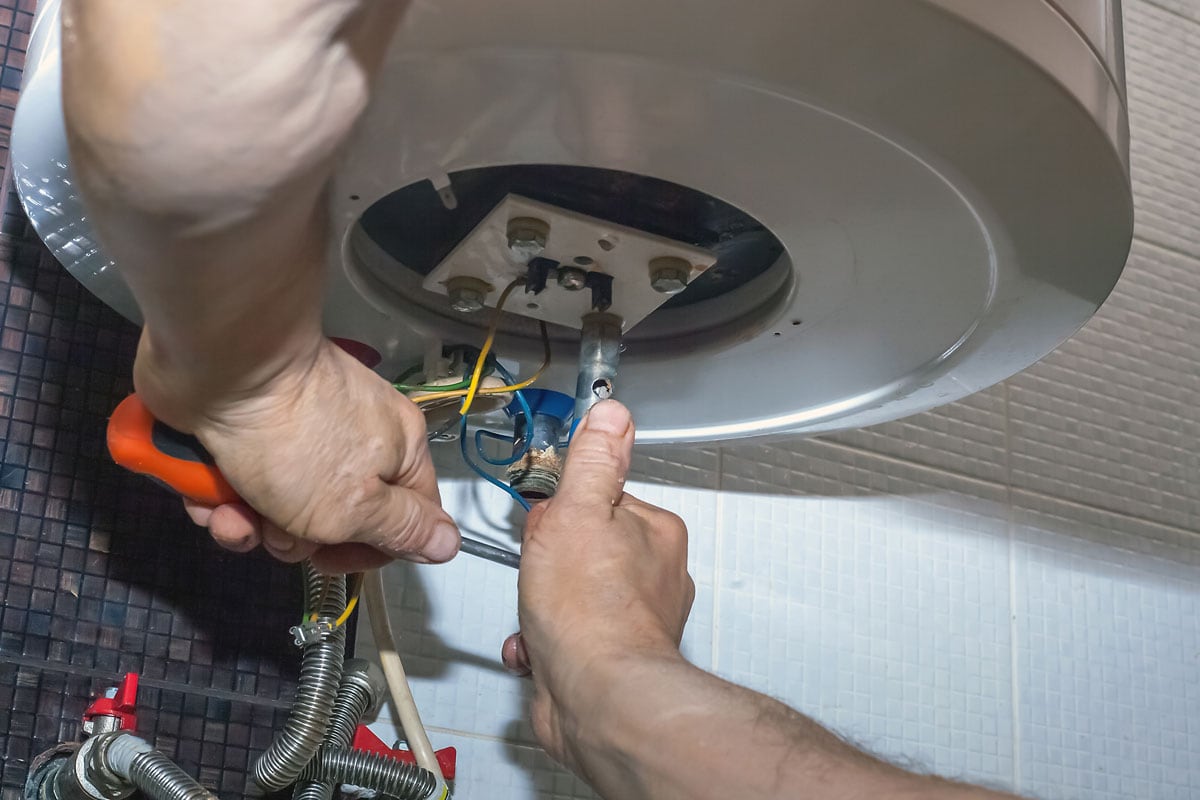
You may be wondering if your water heater's worth the repair cost. Should you just replace it with a new model instead? We will help you decide by listing down the signs that mean you should buy a new one instead. The first on the list is that your water heater's 10 years old or above as they're expected to have a lifespan of 8 to 10 years only.
Next, if the quality of your water's already rusty. This may be because the other parts of your heater like the inside of your tank, the valves, and the pipes are already corroded and are covered in rust.
Another is if the water heater is making any noise. Any rumbling or hissing sound coming from it that is not heard before may be an indication that your water heater's reaching its end. Also, if there are leaks in any part or element of your appliance. This is also an obvious symptom that needs to be checked by the plumbers.
Lastly, if your heater does not have the capability or is having a hard time warming your water. Take note of these points to determine if you should just replace your water heater instead. You can always upgrade to a new and different model that will fit your home's needs.
Conclusion
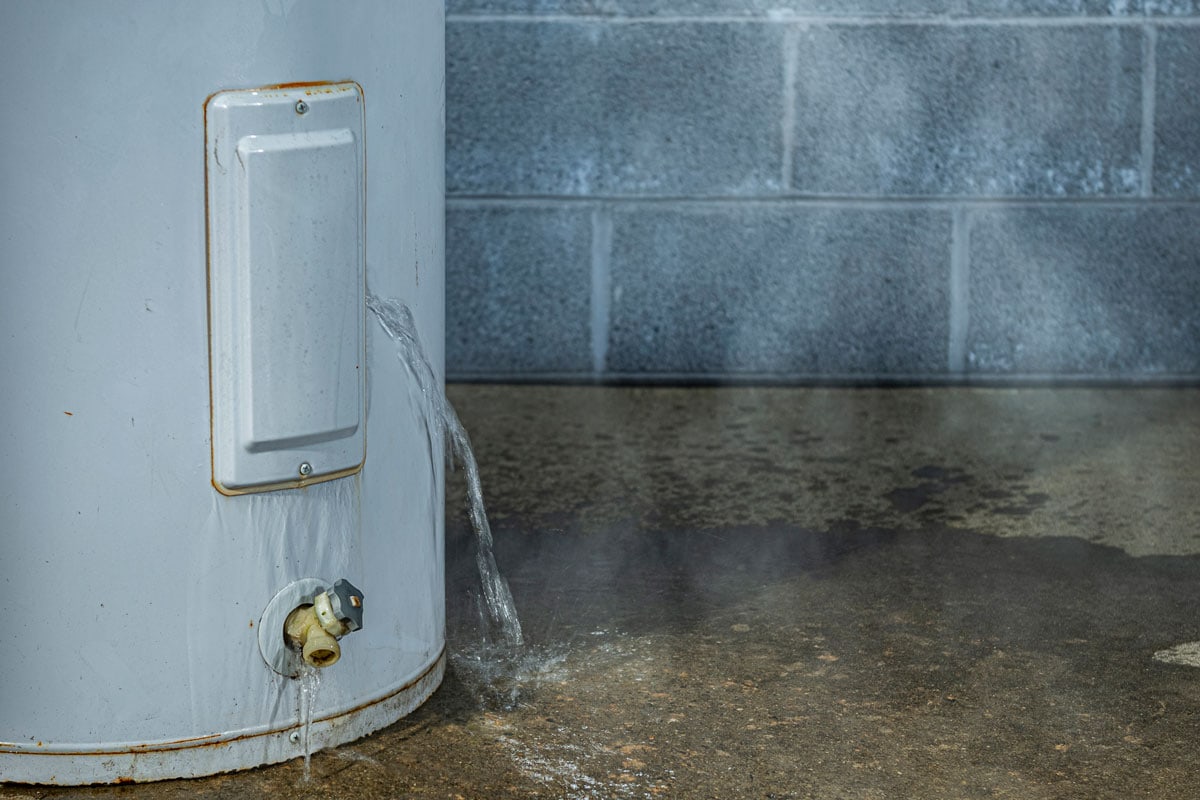
If you notice your water heater leaking, you should determine where it's coming from. Then start turning off the power and water supplies before proceeding to address the issue. Unless the problem requires more than tightening connections using a wrench, contact your local licensed plumbers for help.
